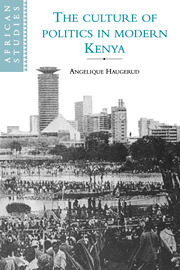Book contents
- Frontmatter
- Contents
- List of maps
- List of tables
- Preface
- 1 Introduction: staging politics in Kenya
- 2 Shattered silences: political culture and “democracy” in the early 1990s
- 3 Open secrets: everyday forms of domination before 1990
- 4 Moral economy and the quest for wealth in central Kenya since the late nineteenth century
- 5 The dove and the castor nut: Embu household economy in the 1980s
- 6 Conclusions: the showpiece of an hour
- Notes
- Bibliography
- Index
- Titles in the series
1 - Introduction: staging politics in Kenya
Published online by Cambridge University Press: 05 June 2012
- Frontmatter
- Contents
- List of maps
- List of tables
- Preface
- 1 Introduction: staging politics in Kenya
- 2 Shattered silences: political culture and “democracy” in the early 1990s
- 3 Open secrets: everyday forms of domination before 1990
- 4 Moral economy and the quest for wealth in central Kenya since the late nineteenth century
- 5 The dove and the castor nut: Embu household economy in the 1980s
- 6 Conclusions: the showpiece of an hour
- Notes
- Bibliography
- Index
- Titles in the series
Summary
If this were played upon a stage now, I could condemn it as an improbable fiction.
William Shakespeare, Twelfth NightA political spectacle
Exuberant showmanship is one enduring face of Kenyan political life. A nineteenth-century European traveler records the scene his own party provoked at a Gikuyu assembly: “the speeches were rather screamed out than spoken, the meaning being emphasized with a club till it was reduced to splinters. The whole bearing of the speakers was aggressive and insolent.” A century later, on a more peaceful occasion, some two hundred people sit in a grassy clearing in Mt. Kenya's foothills. On this sunny day in March 1979, just months after the inauguration of President Moi, I heard a politician tell them: “Not long ago, before we had our new president, there were many things that were spoiling citizens here. There used to be a lot of drunkenness, bribery, corruption.” People have “spoiled the footsteps,” fallen away from the path they should have followed, he went on to say. Now, however, Kenya is a nation “on the move,” “on the run” toward rapid “development,” asserts a fellow politician. He warns the crowd that those who cannot keep up with the new president's rapid footsteps will be left behind in a ditch. The talk is emphatic, vigorous. Though clubs are absent, threats are not.
A great change had occurred, implied orators of the time. Gone were the days when a citizen must “cook tea” (pay a bribe) in return for routine government services.
- Type
- Chapter
- Information
- The Culture of Politics in Modern Kenya , pp. 1 - 14Publisher: Cambridge University PressPrint publication year: 1995

